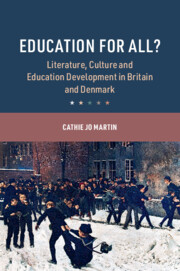Book contents
- Education for All?
- Cambridge Studies in the Comparative Politics of Education
- Education for All?
- Copyright page
- Dedication
- Contents
- Figures
- Tables
- Acknowledgments
- Note on the Text
- Introduction
- 1 Culture and the Politics of Comparative Education Policy
- 2 Culture and Continuity through Institutional Change
- 3 Romancing the Nation: Education and Nation-Building in 1800
- 4 Expanding Educational Access in the Age of Social Realism
- 5 Education in the Age of Empire, Globalization and Technological Change
- 6 Cultural Echoes of the Past in Contemporary Education Reforms
- Bibliography
- Index
Introduction
Education for Some or Education for All?
Published online by Cambridge University Press: 27 September 2023
- Education for All?
- Cambridge Studies in the Comparative Politics of Education
- Education for All?
- Copyright page
- Dedication
- Contents
- Figures
- Tables
- Acknowledgments
- Note on the Text
- Introduction
- 1 Culture and the Politics of Comparative Education Policy
- 2 Culture and Continuity through Institutional Change
- 3 Romancing the Nation: Education and Nation-Building in 1800
- 4 Expanding Educational Access in the Age of Social Realism
- 5 Education in the Age of Empire, Globalization and Technological Change
- 6 Cultural Echoes of the Past in Contemporary Education Reforms
- Bibliography
- Index
Summary
Despite having few natural resources and peasant serfs, Denmark developed public primary education in 1814, while Britain delayed the mass, public school system until 1870 and provided little instruction to working-class students. Later, Denmark’s secondary education system included publicly-funded vocational training programs, while Britain developed a single-track system that ignored technical skills. Fiction writers and their cultural narratives contributed to educational choices. Authors became important individual political agents in school reform movements, by using fiction to advance policy ideas and inspire emotional outrage. Writers collectively contributed to the nationally distinctive symbols and narratives about education that appeared in their country’s literature. Each generation of authors inherited these distinctive cultural tropes from their literary ancestors, reworked these for new problems, and passed these along to future generations. Studying fiction writers and their narratives offers a tangible way to evaluate how culture matters to political outcomes, as we may empirically (with computational linguistics and a close reading of texts) observe significant cross-national differences in historical literary images of education. The work suggests how cultural narratives contribute to the emergence of coordinated and liberal varieties of capitalism and reflects on how cultural narratives provide a source of continuity within long-term processes of institutional change.
Keywords
- Type
- Chapter
- Information
- Education for All?Literature, Culture and Education Development in Britain and Denmark, pp. 1 - 9Publisher: Cambridge University PressPrint publication year: 2023

